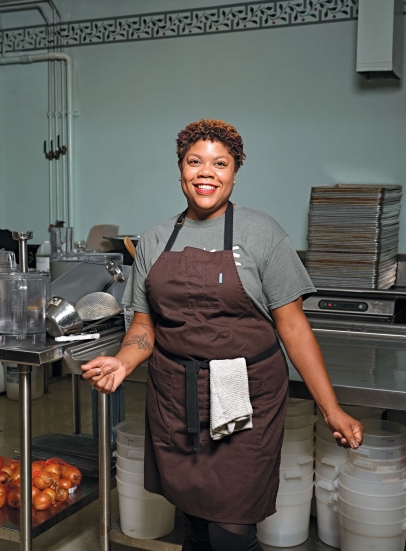Ederique Goudia Wastes Not
Make Food Not Waste’s Lead Chef Makes the Most of It
Ederique Goudia has a lot on her plate. The hours are long when you’re juggling two jobs and three businesses in the food industry. But that’s how to get where she wants to go, she says. And she’s grateful to be in the industry she loves: food.
The lead chef of Make Food Not Waste’s Upcycling Kitchen matter-of-factly shares her love for food preparation, feeding others and collaborating, as she fills Mason jars with still-steaming house-made strawberry-basil jam she and her team made from a sizable basil donation the nonprofit received at the end of September. The jars, separate from Goudia’s regular work, are to go in pre-ordered boxes sold to raise money to offset the kitchen’s costs for the upcoming holiday meal season. Every dollar—like every morsel—counts.
Tucked neatly inside Jefferson Avenue Presbyterian Church, the kitchen’s mint green cupboards stretch along the back wall with a whisper of 1970s church events past as Goudia readies the jars, simultaneously planning the menu for the 200-some neighborhood families to which the church distributes weekly. She quickly and creatively determines what to do with food recently donated, some fresh from farms, markets and commercial kitchens, plus shelf-stable products from manufacturers and distributors and what’s in the freezer, awaiting its turn.
“It’s actually really fun to be able to figure out what we can do,” says Goudia, who has rerolled dough scraps from Gratiot Central Market’s Pietrzyk Pierogi to incorporate into chicken and dumplings or tomato and vegetable soup with dumplings.
“I’m from Louisiana and I was raised not to waste food,” she says. There she grew up across the street from her grandparents, whose vast gardens fed her well. “We ate what we grew; what we harvested. Doing this definitely speaks to the way I was raised. It also makes sense: Treat your friends like family.”
Goudia left Louisiana for Detroit 20 years ago, but finds similarities between the two.
“Detroit will get ahold of you and it won’t let go. It’s very reminiscent of the South. I think there’s a hospitality you don’t see in other places,” she says. “Detroit is a majority Black city and that’s beautiful when you’ve lived in places where you weren’t the majority. I definitely appreciate living in proximity to people who don’t just look like me, but have similar cultural experiences.”
About five years ago, Goudia traded corporate food service management to focus on a dream she’s had since she was 17. “I couldn’t dedicate any time to try to start to build a restaurant with the amount of time and energy I was putting toward a career,” she says, before correcting herself: It was “not just building a restaurant, but building a part of the local food community in Detroit.”
Now, Goudia runs the Upcycling Kitchen; program-manages Detroit Food Academy; runs her own consulting agency, In the Business of Food; co-owns Gabriel Hall, a Creole and Cajun catering and pop-up business working on becoming a brick-and-mortar restaurant; and is co-founder of Taste of the Diaspora, which recently raised $8,500 to benefit Goudia’s hometown Wallace, Louisiana, which was ravaged by Hurricane Ida in late August.
“I’m really grateful I’ve been able to build a career in this industry because it’s exactly what I want to do,” she says. “It’s helping me be better as an employee, as an employer, as a chef, and to be better when the restaurant opens. Part of it is putting to use everything I learn, but also continuing to learn because it’s so complex.”
For Goudia, it helps her be part of the solution to fight food waste, a significant contributor to climate change, while helping lessen Detroit’s food insecurity problem. Forty percent of what’s grown in the United States goes to a landfill, she says, adding that according to the Detroit Food Council, 48 percent of Detroit households are food insecure.
“Everything I do is literally community-focused and collaborative,” she says, including shining the light on others, especially getting Black and Brown women chefs working at MFNW. “I try to carry it along with everything I do, having one thing teaching and impacting another.”
One donation paints the picture well: King Arthur Baking Co. donated 1,400 five-pound bags of bread flour to DFA students for their capstone projects. What remained went to MFNW.
“That’s why we’re able to have bread every week,” she says. “‘Breaking bread’—there’s a reason that bread was used in that analogy. It really does symbolize community, sharing and fellowship.”
Learn more about Ederique Goudia on Instagram @egomichele or Facebook @ederique.goudia. To donate or learn more about Make Food Not Waste and its Upcycling Kitchen, visit makefoodnotwaste.org.





